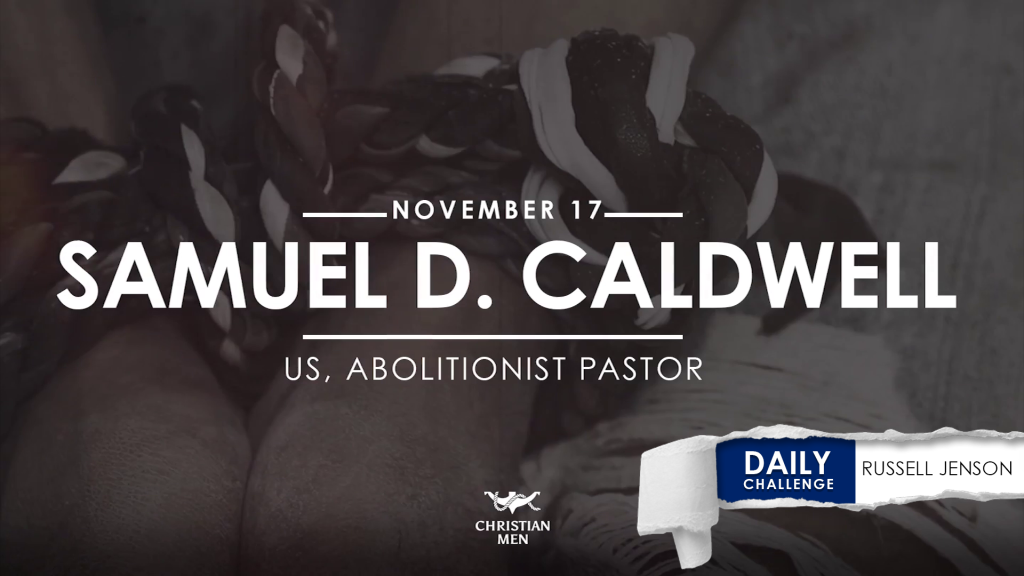November 17. Samuel Caldwell. At a time when racial tension threatened to cripple the city, only a brief line in an 1842 newspaper marks Caldwell’s act of wisdom and compassion, but what he did saved a man’s life, established his family, helped secure peace in Boston, and strengthened the abolitionist movement. On this date in 1842, Caldwell handed over the money collected to secure George Latimer’s freedom.
Even if you never make headlines, doing good can pay lasting dividends.
When this story started, Caldwell didn’t know a man named George Latimer, who lived in Boston. But the man was a fugitive slave, and his former abusive “owner,” James Gray, intended to get his “property” back. So Gray arranged with his crooked cronies to have Latimer accused of a crime he didn’t commit.
But when George Latimer was thrown into jail on the trumped-up charges, Boston surged with emotion. And James Gray arrived to take his property—a human being named George Latimer—back to Virginia—back to slavery.
Abolitionists held a charged town meeting and demanded Latimer’s freedom. Three-hundred free black men surrounded the Boston courthouse to make sure Latimer wasn’t taken from the city without due process of law.
Local men of influence established The Latimer Journal and North Star, an abolitionist paper, and distributed it to 20,000 readers. In its November 16 issue, the Journal published Rescue the Slave, a six-stanza call to arms.
Sadly the fugitive weeps in his cell.…
Praying for liberty, dearer than life,
Torn from his little one, torn from his wife,
Flying from slavery, hear him and save….
Christian men! Christian men! help the poor slave!
Boston responded with outrage. Passionate men pledged to ensure Latimer’s freedom. And if necessary, to use force.
While Boston raged, Pastor Caldwell and the parishioners of Tremont Temple responded with wisdom and compassion. They worked tirelessly to raise money to buy Latimer’s freedom. The people gave sacrificially—from compassion, not abundance. In a city of swirling emotion, Caldwell offered a peaceful solution. He purchased Latimer’s freedom for $400.
Caldwell played a key role in calming Boston’s explosive passions. Instead of violence, Bostonians then focused on work that became a game-changer in the fight to end slavery in America. More than 65,000 people petitioned the state for legislation to protect former slaves who had sought refuge in Massachusetts.
Caldwell also rescued a man and freed his family to thrive. Latimer’s wife Rebecca birthed three sons, and one of them, Lewis, grew to be a brilliant drafter and inventor, who collaborated with such geniuses as Alexander Graham Bell.
Caldwell’s actions mirror God’s character.
“Who executes justice for the oppressed; Who gives food to the hungry. The LORD sets the prisoners free” (Psalm 146:7 NASB).
What is one wise, compassionate response you can offer to a situation of tension in your life? You never know what current of good can come out of the quiet ripple you create. Even if you never make headlines, doing good can pay lasting dividends.
Boston Atlas. November 11, 1842.
The Latimer Journal and North Star (Boston, MA). November 16, 1842.
Mac, Toby, and Michael Tait. “Chapter 47.” In Under God. Minneapolis: Bethany House Publishers, 2004.
Davis, Asa J. “The George Latimer Case: A Benchmark in the Struggle for Freedom.” Last modified November 21, 2005. http://edison.rutgers.edu/latimer/glatcase.htm.
Story read by: Nathan Walker





